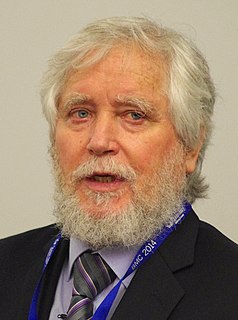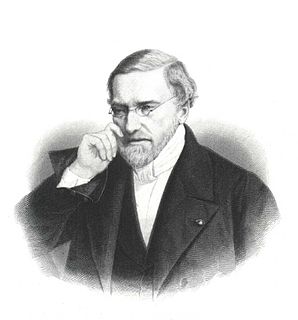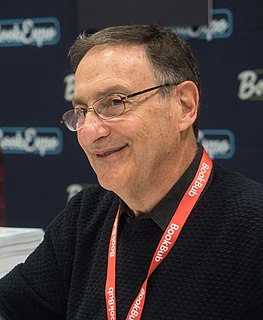A Quote by Henri Poincare
I then began to study arithmetical questions without any great apparent result, and without suspecting that they could have the least connexion with my previous researches. Disgusted at my want of success, I went away to spend a few days at the seaside, and thought of entirely different things. One day, as I was walking on the cliff, the idea came to me, again with the same characteristics of conciseness, suddenness, and immediate certainty, that arithmetical transformations of indefinite ternary quadratic forms are identical with those of non-Euclidian geometry.
Quote Topics
Again
Any
Apparent
Away
Began
Came
Certainty
Characteristics
Cliff
Connexion
Could
Day
Days
Different
Different Thing
Different Things
Disgusted
Entirely
Few
Forms
Geometry
Great
Idea
Identical
Immediate
Indefinite
Least
Me
One Day
Previous
Questions
Result
Same
Spend
Study
Success
Then
Things
Those
Thought
Walking
Want
Without
Related Quotes
I entered an omnibus to go to some place or other. At that moment when I put my foot on the step the idea came to me, without anything in my former thoughts seeming to have paved the way for it, that the transformations I had used to define the Fuchsian functions were identical with non-Euclidean geometry.
Too much knowledge could be a bad thing. I was lead to the Szemerédi theorem by proving a result, about squares, that Euler had already proven, and I relied on an "obvious" fact, about arithmetical progressions, that was unproved at the time. But that lead me to try and prove that formerly unproved statement- about arithmetical progressions-and that ultimately lead to the Szemerédi Theorem.
In fact, Gentlemen, no geometry without arithmetic, no mechanics without geometry... you cannot count upon success, if your mind is not sufficiently exercised on the forms and demonstrations of geometry, on the theories and calculations of arithmetic ... In a word, the theory of proportions is for industrial teaching, what algebra is for the most elevated mathematical teaching.
When the aggregate amount of solid matter transported by rivers in a given number of centuries from a large continent, shall be reduced to arithmetical computation, the result will appear most astonishing to those...not in the habit of reflecting how many of the mightiest of operations in nature are effected insensibly, without noise or disorder.
I have spent much time in the study of the abstract sciences; but the paucity of persons with whom you can communicate on such subjects disgusted me with them. When I began to study man, I saw that these abstract sciences are not suited to him, and that in diving into them, I wandered farther from my real object than those who knew them not, and I forgave them for not having attended to these things. I expected then, however, that I should find some companions in the study of man, since it was so specifically a duty. I was in error. There are fewer students of man than of geometry.
Archimedes to Eratosthenes greeting. ... certain things first became clear to me by a mechanical method, although they had to be demonstrated by geometry afterwards because their investigation by the said method did not furnish an actual demonstration. But it is of course easier, when we have previously acquired by the method, some knowledge of the questions, to supply the proof than it is to find it without any previous knowledge.
I think the most remarkable thing about ice, in my opinion at least, is that it occurs in many, many, many different forms. Most solids occur in typically one or maybe two or three different forms, and ice has approximately 15 different crystal forms, as well as two forms that are called amorphous, which means without any shape at all.
We can no longer communicate with the apes by direct language, nor can we understand, without special study, their modes of communication which we have long since replaced by more elaborate forms. But it is at least presumable that they could still detect in our speech, at least when it is public and elaborate, the underlying tone values with which it began. Thus if we could take a gibbon ape to a college public lecture, he would not understand it, but he would "get a good deal of it." This is all the students get anyway.
What we are told of the inhabitants of Brazil, that they never die but of old age, is attributed to the tranquility and serenity of their climate; I rather attribute it to the tranquility and serenity of their souls, which are free from all passion, thought, or any absorbing and unpleasant labors. Those people spend their lives in an admirable simplicity and ignorance, without letters, without law, without king, without any manner of religion.
And the Grinch, with his Grinch-feet ice cold in the snow, stood puzzling and puzzling, how could it be so? It came without ribbons. It came without tags. It came without packages, boxes or bags. And he puzzled and puzzled 'till his puzzler was sore. Then the Grinch thought of something he hadn't before. What if Christmas, he thought, doesn't come from a store. What if Christmas, perhaps, means a little bit more.
Here I beg you to observe in passing that the scruples that prevented ancient writers from using arithmetical terms in geometry, and which can only be a consequence of their inability to perceive clearly the relation between these two subjects, introduced much obscurity and confusion into their explanations.






































